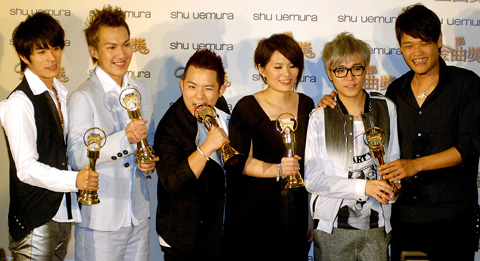In an evening that saw the comeback of big-name stars, Jay Chou (周杰倫) triumphed, picking up the Best Composer and Best Song awards for the single Blue and White Porcelain (青花瓷), which also won his long-term partner Vincent Fang (方文山) the title of Best Lyricist. Even Chou's music work for his directorial debut Secret (不能說的秘密) won big in the usually overlooked instrumental music categories, grabbing top honors in Best Composer and Best Album Producer sections.
The biggest surprise of the night was Karen Mok, who walked home with the Best Mandarin Album award.
The 19th Golden Melody Awards (第十 九屆金曲獎) took place at Taipei Arena (台北巨蛋) last night, with pop music awards handed out in a total of 23 categories chosen from among more than 100 nominees by a 33-member panel of judges after four rounds of jury meetings.

PHOTO: AFP AND TAIPEI TIMES
The nominees in this year's pop music categories contained many familiar faces. Jay Chou (周杰倫) garnered the most nominations including Best Song, Best Mandarin Album, Best Composer and Best Lyricist. Tanya Chua (蔡健雅) was another strong contender with seven nominations, followed by folk-rock band Sodagreen (蘇打綠) with six.
The coveted Best Band award went to last year's titleholder Sodagreen (蘇打綠), beating out all-girl rock band Cheery Boom (櫻桃幫) and the more experimental Hakka hip-hop outfit Kou Chou Ching (拷秋勤).
In the hotly contested Best Mandarin Female Singer category, Tanya Chua (蔡健雅) beat out strong contenders A-mei (張惠妹), Stefanie Sun (孫燕姿) and Fish Leong (梁靜茹) to walk away with the trophy. The Best Mandarin Male Singer went to Gary Tsao (曹格) from Malaysia.

PHOTO: AFP AND TAIPEI TIMES
Despite the large number of nominations for his album On the Run (我很忙), Chou did not attend the ceremony. The Chairman was busy touring China instead.
Among the best-dressed stars were members of pop-rock band Won Fu (旺福樂團), who might have started a new trend when they showed up decked out in retro disco era-duds. Karen Mok (莫文蔚) was, as always, easy on the eyes with her long legs and tasteful yet revealing dress.
Pop diva A-mei (張惠妹), unfortunately, ditched her tai mei (台妹) look and went for an unflattering all-black evening dress that made her look flat-chested and slightly chubby. Hong Kong's Eason Chan (陳奕迅) grabbed attention with a noticeably receding hairline.
The "Queen of Cute," Rainie Yang (楊丞琳) decided to adorn her wholesome good looks with a dull one-piece dress and black stockings, while Jolin Tsai (蔡依林) looked like she was trying too hard in a dress that resembled a pink-and-white knot.
Hip-hop outfit Da Mouth (大嘴巴) won for Best Singing Group category. When asked backstage how she felt about her group's winning the award for their debut album, Japanese starlet-turned-hip-hop artist Ai Sha (愛紗) said, "we are all in shock."
This year's jury was unusually keen on giving artists two awards. Not surprisingly, visually-impaired musician Hsiao Huang-chi (蕭煌奇) beat out last year's titleholder Shih Wen-bin (施文彬) and veteran crooner Wang Shi-xian (王識賢) to pick up the Best Taiwanese Male Singer trophy. Hsiao also won Best Taiwanese-language Album later last night.
Ipay Buyci took top honors in both the Best Aboriginal Album and Best Aboriginal Singer categories for her pop-music album sung in Atayal (泰雅).
Another double winner was veteran Hakka musician Ayu Huang (黃連煜), who garnered Best Hakka Album and Best Hakka Singer for his album 2007 Banana. Brimming with gratitude during his acceptance speech, Huang first thanked the jury for being nice enough to give an award to someone who made his first solo album at the age of 50. The long thank-you list Huang read from included "those friends who have lent me money and dared not ask me to pay it back."
The recipient of this year's Lifetime Contribution Award was Chen Chih-yuan (陳志遠), one of the key figures in the folk music, or minge (民歌), movement in the 1980s. Chen is best known for his many award-winning arrangements for pop singers such as Tsai Chin (蔡琴), Pan Yue-yun (潘越雲), Su Jui (蘇芮) and, more recently, A-mei.
Gongs for the 19th Golden Melody Awards' Artistic and Traditional music categories were handed out late last month to little fanfare.

As Taiwan’s second most populous city, Taichung looms large in the electoral map. Taiwanese political commentators describe it — along with neighboring Changhua County — as Taiwan’s “swing states” (搖擺州), which is a curious direct borrowing from American election terminology. In the early post-Martial Law era, Taichung was referred to as a “desert of democracy” because while the Democratic Progressive Party (DPP) was winning elections in the north and south, Taichung remained staunchly loyal to the Chinese Nationalist Party (KMT). That changed over time, but in both Changhua and Taichung, the DPP still suffers from a “one-term curse,” with the

Jan. 26 to Feb. 1 Nearly 90 years after it was last recorded, the Basay language was taught in a classroom for the first time in September last year. Over the following three months, students learned its sounds along with the customs and folktales of the Ketagalan people, who once spoke it across northern Taiwan. Although each Ketagalan settlement had its own language, Basay functioned as a common trade language. By the late 19th century, it had largely fallen out of daily use as speakers shifted to Hoklo (commonly known as Taiwanese), surviving only in fragments remembered by the elderly. In

William Liu (劉家君) moved to Kaohsiung from Nantou to live with his boyfriend Reg Hong (洪嘉佑). “In Nantou, people do not support gay rights at all and never even talk about it. Living here made me optimistic and made me realize how much I can express myself,” Liu tells the Taipei Times. Hong and his friend Cony Hsieh (謝昀希) are both active in several LGBT groups and organizations in Kaohsiung. They were among the people behind the city’s 16th Pride event in November last year, which gathered over 35,000 people. Along with others, they clearly see Kaohsiung as the nexus of LGBT rights.

In the American west, “it is said, water flows upwards towards money,” wrote Marc Reisner in one of the most compelling books on public policy ever written, Cadillac Desert. As Americans failed to overcome the West’s water scarcity with hard work and private capital, the Federal government came to the rescue. As Reisner describes: “the American West quietly became the first and most durable example of the modern welfare state.” In Taiwan, the money toward which water flows upwards is the high tech industry, particularly the chip powerhouse Taiwan Semiconductor Manufacturing Co (TSMC, 台積電). Typically articles on TSMC’s water demand